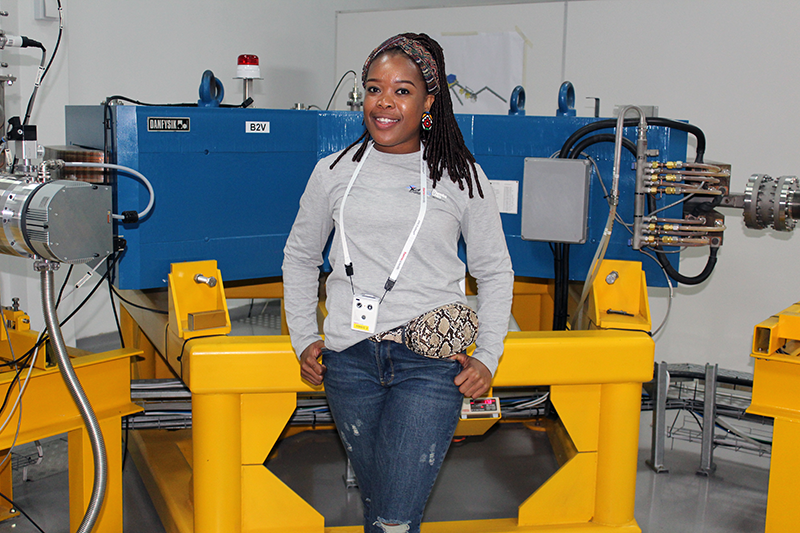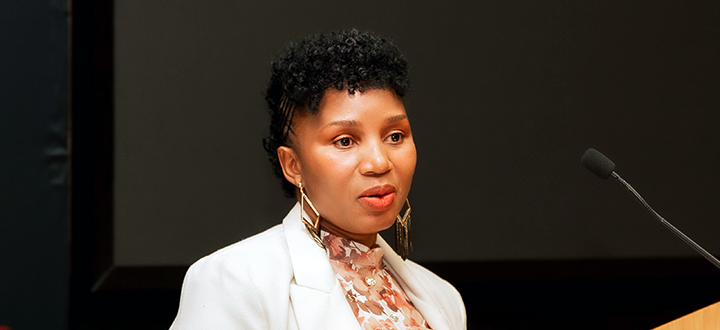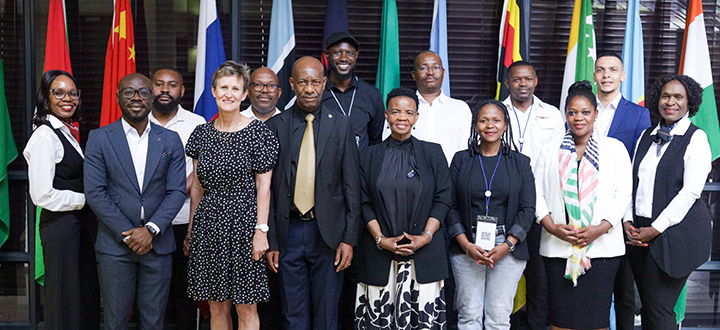College of College of Graduate Studies
Trailblazer in nano to lighten the electricity load

Boitumelo Mafalo Mabakachaba (Research student: UNESCO–Unisa Africa Chair in Nanoscience and Nanotechnology) in the lab
South Africa is currently experiencing a shortage of electricity to supply the residential, industrial, and transport sectors, mainly used for the heating and cooling of structures.
In seeking to lighten the burden, Boitumelo Mafalo Mabakachaba, a research student in the UNESCO–Unisa Africa Chair in Nanoscience and Nanotechnology, is developing VO2-coated windows/devices for heat regulation that will significantly decrease the amount of energy consumed.
“Since South Africa is one of the three source countries of vanadium, a chemical element, we can use this to our advantage in developing energy-efficient and environmentally friendly devices. We have significant potential to save money and increase the share of renewable and sustainable energy,” she says.
Energy-saving and power-efficient material
Mabakachaba’s research focuses on the development of energy-saving and power-efficient materials at nanoscale in response to the tremendous increase in energy consumption and the need for small and compact electronic devices. The study involves growing VO2 thin films and modifying their properties to obtain new and different properties and new effects of nanostructures, which will lead to the implementation of completely new device concepts and applications while enhancing the reliability and performance of the devices to meet daily demands.
En route to saving energy for SA
Mabakachaba, who hails from Senwamokgope, a small township in Limpopo, is reflective and analytical, and she readily accepts challenges. After matriculating in 2012, she obtained a BSc degree in Physics and Chemistry at the University of Venda. In 2017, she joined the MANUS/MATSci honours and master’s programmes, completing her honours degree in Physical Sciences (majoring in Material Sciences) at the University of the Western Cape.
A remarkable young woman who combines a high level of intellect with leadership abilities, Mabakachaba has recently completed her MSc in Physical Sciences cum laude under the supervision of Professor Malik Maaza, incumbent of the UNESCO-Unisa Africa Chair in Nanoscience and Nanotechnology. She did so while tutoring phase 1 learners in the Second Chance Matric Support Programme, an initiative of the Department of Education in the Western Cape. “My passion is finding ways to improve the current technological drawbacks and contribute valuable scientific knowledge to the research and development community,” she remarks.
Having to move out of her comfortable and highly resourced workstation at iThemba Labs, Cape Town, to work from home owing to the Covid-19 pandemic, it has initially been hard for Mabakachaba to conduct research. However, she believes challenges are there not to paralyse us, but to help us discover our true nature and to maximise our potential. “I am very productive when I work under pressure, and difficulties/challenges with a bit of hope fuel my creativity and my journey,” she said.
Human capital development through the UNESCO–Unisa Africa Chair
As part of the programme, Mabakachaba receives full sponsorship. This allows her to do local and international academic research and gives her access to training in techniques that are relevant to her study and one-on-one project discussions with Maaza, who is her supervisor.
The UNESCO–Unisa Africa Chair in Nanoscience and Nanotechnology has enabled Mabakachaba to refine her research project, which aims to offer an alternative way to solve the country’s electricity problems using material that currently acts as a thermal-regulating layer in small and compact spacecraft. The title of her thesis is Carbon, magnesium implantation and proton irradiation on pulsed laser deposited thermochromic thin film of VO2.
Research publications and collaborations
Mabakachaba has thus far contributed to the scientific body of knowledge by authoring and co-authoring three research articles published in ISI–SCI international peer-reviewed journals:
- Structural and electrical properties of Mg-doped vanadium dioxide thin films via room-temperature ion implantation
- Influence of C-implanted ions on the transition properties of VO2 thin films
- VO2-based active tunable emittance thermochromic flexible coatings
Mabakachaba has also collaborated with international and local institutions such as the INRS Laboratory of Micro and Nanofabrication (LMN) in Canada, GNS Science in New Zealand, and the University of Pretoria. She has attended international conferences for the Africa Material Society in Arusha, Tanzania and NANOSMAT–Middle East at Abu Dhabi Polytechnic (UAE) on surface, coatings, and nanostructured materials.
Mabakachaba’s PhD candidacy collaboration with the Le Mans Institute of Molecules and Materials (IMMM, CNRS at Le Mans University) in France has been finalised. She hopes to receive the L’Oréal Women in Science–South Africa Award, which will assist in financing the collaboration.
*By Mpho Moloele, PR and Communications Assistant, Department of Research, Innovation, and Commercialisation
Teaser image background sourced from PickPik under a Creative Commons licence.
Publish date: 2020-11-16 00:00:00.0


 Wings of opportunity: Bringing drones into the classroom
Wings of opportunity: Bringing drones into the classroom
 Visionary youth champion to address Unisa’s Innovation Festival
Visionary youth champion to address Unisa’s Innovation Festival
 Finding the strength to persevere
Finding the strength to persevere
 Disability awareness at Unisa: Disability is not inability
Disability awareness at Unisa: Disability is not inability
 Unisa symposium shares knowledge on building SA's aviation economy
Unisa symposium shares knowledge on building SA's aviation economy